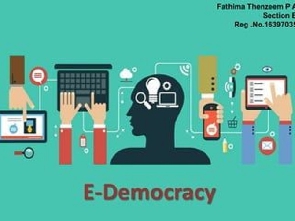Opinions of Monday, 10 July 2023
Columnist: Pascal kafui Oclou
The rise of digital democracy: How technology is transforming political engagement
In an increasingly interconnected world, the rise of digital democracy is reshaping political engagement and transforming the way citizens interact with their governments. Technology has become a powerful tool, empowering individuals to participate in the political process, voice their opinions, and hold their leaders accountable.
This article explores the impact of technology on political engagement and the opportunities and challenges it presents in the realm of digital democracy.
Enhanced access to information and civic awareness
Technology has revolutionized access to information, enabling citizens to stay informed and engaged in political matters. The internet, social media platforms, and digital news outlets provide instantaneous access to a wealth of information, empowering individuals to educate themselves on political issues, policies, and the actions of their elected representatives. This newfound knowledge fosters civic awareness, enabling citizens to make informed decisions and engage in constructive political discourse.
Broadening political participation
Digital democracy has broadened the avenues for political participation, enabling citizens to engage beyond traditional means such as voting and attending rallies. Social media platforms and online forums serve as virtual town halls, facilitating discussions, and allowing citizens to express their opinions, raise concerns, and connect with like-minded individuals. Online petitions, crowdfunding platforms, and grassroots movements driven by technology have become powerful tools for mobilizing support and effecting change.
Transparency and accountability
Technology has increased transparency in governance, enabling citizens to hold their leaders accountable. Open data initiatives, online portals, and government websites provide access to information on public spending, policies, and decision-making processes. Digital platforms also facilitate the reporting of corruption, fostering a culture of accountability. Citizen journalism, empowered by mobile devices and social media, allows for the rapid dissemination of information and the exposure of wrongdoing.
Election campaigns and political messaging
Technology has revolutionized election campaigns and political messaging. Candidates and political parties utilize social media platforms, targeted advertising, and data analytics to reach voters and tailor their messages. Online fundraising platforms have democratized campaign financing, allowing grassroots candidates and causes to compete with established political entities. However, the influence of technology on political campaigns also raises concerns about privacy, manipulation, and the role of social media platforms in shaping public opinion.
Challenges and future considerations
While the rise of digital democracy presents numerous opportunities, it also comes with challenges. The digital divide, unequal access to technology, and online misinformation pose risks to inclusivity and informed decision-making. Ensuring data privacy, protecting against cyber threats, and addressing algorithmic biases are crucial considerations in building a robust digital democracy. Striking a balance between regulation and freedom of expression is a delicate task, requiring ongoing dialogue and collaboration between governments, technology companies, and civil society.
The rise of digital democracy is transforming political engagement, empowering citizens, and reshaping the relationship between governments and the governed. Technology has amplified the voices of individuals, expanded political participation, and fostered transparency and accountability.
However, realising the full potential of digital democracy requires addressing challenges related to access, privacy, and misinformation. By harnessing the power of technology responsibly, society can create a more inclusive and participatory political landscape, where citizens actively contribute to shaping their communities and holding their leaders accountable.













